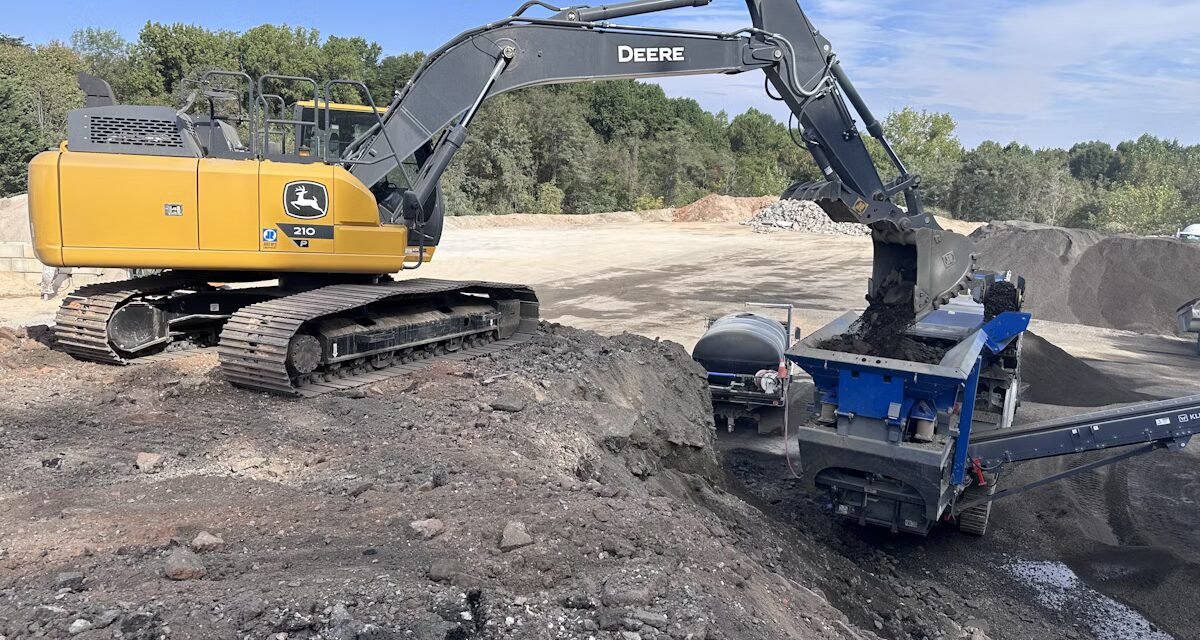For a lot of asphalt and pavement upkeep contractors, the piles of leftover millings, damaged concrete, and truck washouts that accumulate over a season are seen as waste, an issue to be handled, materials to be hauled away someplace. In some areas this waste even comes with its personal prices related to dumping it. However a rising variety of forward-thinking contractors are realizing that these “waste” piles can turn into a revenue heart.
Crushing reclaimed asphalt pavement (RAP) and concrete isn’t nearly sustainability. It’s about creating new materials streams, chopping disposal prices, and constructing independence from third-party mixture suppliers. As a number of contractors have found, including a crusher to the yard can change an organization’s monetary image in stunning methods.
 Adam Rahn
Adam Rahn
A Native Paver’s Crushing Success
In central North Carolina, Piedmont Paving made a transfer practically six years in the past that appeared dangerous and out of the abnormal on the time. What started as a facet venture on a small plot of land is now a full-scale materials operation serving each their very own wants, in addition to different contractors who want supplies or are simply in search of a spot to eliminate their waste.
What they demonstrated is that, even should you do not personal an asphalt plant, even by itself, crushing might be worthwhile, environment friendly, and a sport changer for any dimension paving contractor.
Matt McGee of Piedmont Paving mentioned the choice got here from seeing worth the place others noticed waste. “My dad, David McGee, and Mark Rountree… at all times had individuals asking what we do with these millings. They wished to purchase them,” McGee defined. “They used [the millings] for driveways, paths, and different issues, whereas most individuals in our trade, are attempting to eliminate them.”
Relatively than making a gift of RAP to native vegetation or paying to eliminate concrete, Piedmont determined to start out processing it themselves.
“We began simply feeding ourselves,” McGee mentioned. “As a substitute of taking it to the asphalt plant, the place we don’t get something for it in return, we ended up buying this property, and it’s grown exponentially since we began.” Brandon Noel
Brandon Noel
The operation now handles about 5,000 to six,000 tons at a time. “We do not cost for it, all people dumps free of charge,” McGee mentioned. “If it’s clear asphalt or clear concrete, we’ll take it.”
That free dumping coverage ensures a gentle move of inbound materials.
“We’ve two concrete firms that come and wash out all their vehicles day-after-day, so we’re getting ten, twenty, thirty yards a day of concrete washout,” he added.
Every load that is available in turns into contemporary stock. The crushed product, which incorporates asphalt all the way down to, “five-eighths minus, by the scale of your thumbnail,” McGee mentioned, is bought for driveways, street initiatives, and even different asphalt vegetation name them up.
“Different contractors will purchase the crushed concrete as a result of it’s simply pretty much as good as stone,” McGee mentioned. “It takes extra water to arrange, however when you set it, I believe it units up higher than stone.”
From Aspect Hustle to Self-Sustaining Enterprise
The corporate’s first clients had been different paving vegetation that wanted clear RAP. “We ended up really promoting it for the primary two-or-three years to a paving plant out within the boonies that had been having hassle getting RAP,” McGee recalled. “They might ship ten vehicles on the weekends, and we’d have any person load them out, and they might purchase each single lick of it.”
As soon as the phrase unfold, Piedmont didn’t should market a lot. For some time, McGee experimented with Fb Market. It turned out to be nearly too profitable.
“Once I inform you I couldn’t sustain with the orders and the messages,” he mentioned, “I needed to shut that down.” Right now, the operation sells itself, with a number of trucking firms selecting up and reselling crushed materials.
“We simply load them and cost them,” McGee mentioned.
The corporate’s funding in crushing tools additionally paid off when it comes to effectivity. “It’s a German-engineered machine. It’s like a Swiss watch,” McGee mentioned, describing their Kleeman affect crusher. “It’s electrical over hydraulic… there’s a magnet that will get out any metals… and something that’s too large will get filtered again via on the underside conveyor to undergo yet another time to ensure it will get crushed all the way in which”. Adam Rahn
Adam Rahn
All of this runs with a minimal crew. “I solely see the 2 guys right here,” Brandon famous within the interview. McGee confirmed, “That runs the entire operation… three days, and so they’ll be achieved crushing this”. Regardless of the lean setup, the corporate can’t maintain product in inventory. “Even that pile proper there that’s not crushed but is already bought,” McGee mentioned. “We will’t maintain it in inventory”.
The Broader Case for Crushing
The expertise at Piedmont echoes what tools producers and producers are seeing throughout the asphalt trade.
[NAME, TITLE] from main crusher producer Eagle Crusher defined in a Q&A that, “Having on-site crushing capabilities permits asphalt contractors the chance to each get monetary savings by recycling RAP in addition to introduce new income streams by accepting RAP from third events… and, if the enterprise case helps it, cost to simply accept the supplies.”
For paving contractors, this may imply remodeling waste into wealth. As a substitute of paying charges or hauling off-site, each ton of crushed asphalt or concrete turns into stock, usable base materials to your personal initiatives, or sellable mixture. Past financial savings, there’s independence.
“Crushing on-site signifies that your operation isn’t beholden to contract crushing operations or third-party suppliers to your RAP,” [NAME] mentioned.
That management over provide might be important when market volatility, trucking shortages, or excessive mixture demand trigger costs to spike. For higher-volume operations, the return on funding can come rapidly.
“Increased-volume asphalt vegetation can simply see their RAP crushing system funding recouped inside a single paving season,” they mentioned.
That sort of turnaround is uncommon for capital tools, and it speaks to the excessive demand for RAP and crushed concrete in right now’s roadbuilding market.
Cell, Modular, and Multi-Function
One other main benefit is the pliability. Whereas cell/moveable crushing tools often isn’t straight tied right into a HMA manufacturing system, effectively thought out plant layouts or crushing operations like Piedmont’s can imply minimal effort to feed RAP bins for asphalt manufacturing.  Adam Rahn
Adam Rahn
With that modularity additionally creates alternatives past asphalt. “When an asphalt plant makes use of cell or moveable crushers to course of RAP for their very own combine, if there may be downtime, the crushers might be despatched offsite to crush different supplies,” [NAME] defined. This will open a brand new enterprise line and enhance revenues.
For contractors who already handle milling, trucking, and web site prep, it is a logical extension of their capabilities. Crushed materials is at all times in demand.
McGee put it plainly, “They only come wash out. It’s simply cash within the financial institution”.
Sustainability That Pays
Whereas sustainability targets usually drive recycling discussions, the enterprise case is simply as sturdy. Reusing concrete washouts, accepting millings from different contractors, and turning discarded materials right into a sellable product cut back landfill waste whereas enhancing group relations and assembly regulatory expectations. However for many contractors, the mathematics is what seals the deal.
Each truckload that used to value cash to dump now generates income. Each crushed ton reduces the necessity to purchase virgin mixture. And each cubic yard of unpolluted materials reused on a jobsite shortens haul instances, reduces gas prices, and retains crews working.
Because the asphalt and pavement upkeep industries proceed to navigate rising materials costs and tightening environmental requirements, the contractors who crush would be the ones who come out forward, not simply in sustainability stories, however on the stability sheet.



![Fix Pokemon Go Error 12 without modifying the iOS 18] ]](https://tech9dot.com/wp-content/uploads/2024/10/Pokemon-Go-Error-12-Guide-1200x675-440x264.jpg)

